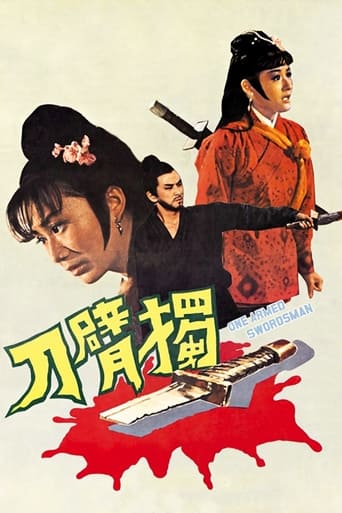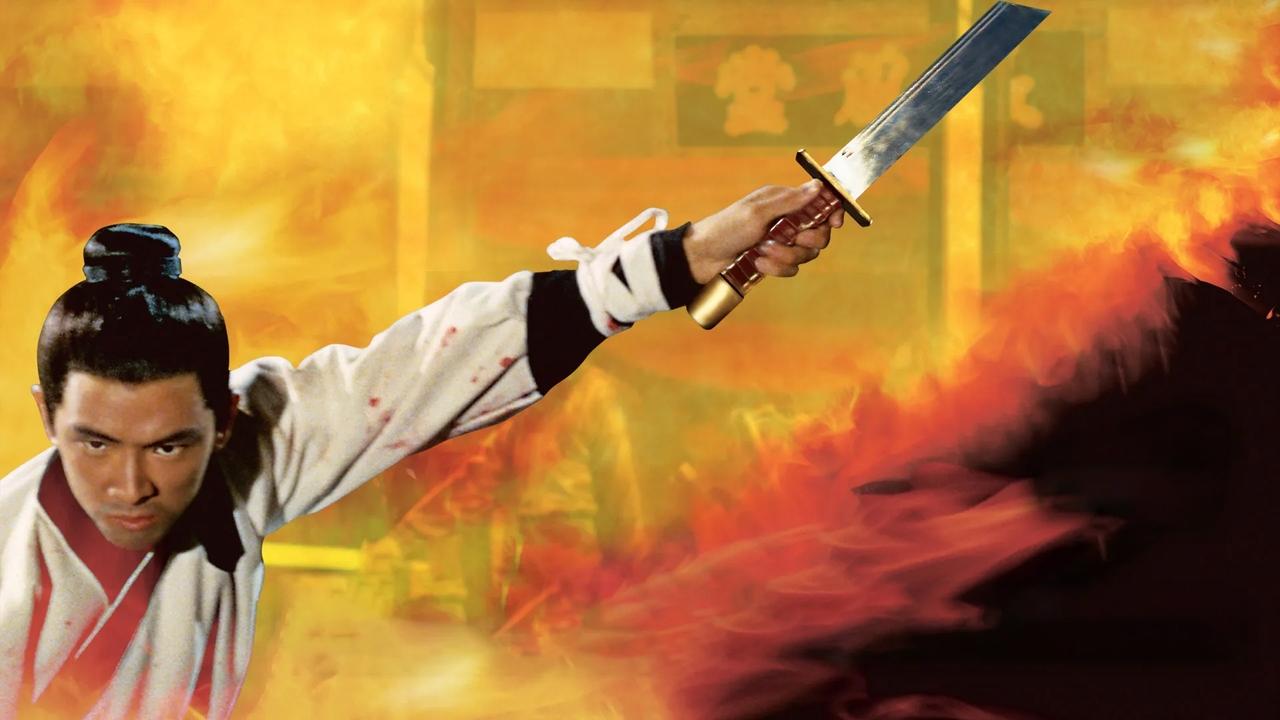gavin6942
An evil gang attacks the Chi school of Golden Sword Kung Fu. One student sacrifices his life to save his teacher and his school, his dying wish is that his son be taken in as a student. Young Fang Kang grows up in the school and treasures his father's broken sword and the memory of his father's sacrifice. The other students (including the teacher's daughter) resent him and try to drive him away. The teacher's daughter challenges him to a fight and when he refuses she becomes enraged and recklessly chops off his arm! Directed by Chang Cheh ("Five Deadly Venoms"), this was the first Hong Kong film to make HK$1 million at the local box office, propelling its star Jimmy Wang to super stardom. I am really beginning to appreciate the kung fu genre, especially when there is a gimmick -- a swordsman with one arm? Sounds good to me. And apparently it sounded good to many other people, because there was a sequel and a few spinoffs, too.
SnoopyStyle
Fang Kang's father sacrificed himself to save his master Qi RuFeng during an underhanded attack. Master Qi is famous for his Golden Sword Kung Fu and takes Fang Kang as his student. Fang Kang's prized possession is his father's broken Golden Sword. Years later, Qi's only child spoiled daughter Peier and other students hate the humble Fang Kang and look down on him as a servant's son. Fang Kang sets out to walk away from an impending confrontation but Peier insists on fighting. She underhandedly chops off Fang Kang's right arm. He walks off and rescued by XiaoMan. She's an orphan turned pacifist farmer after her swordsman father was killed. She kept a burned swordsmanship book and with his father's broken sword, Fang Kang recovers to be an one-armed swordsman. Master Qi is calling in his disciples to take over as the new master. Old rivals Smiling Tiger and his older brother Long-armed Devil are out to kill them. Long-armed Devil has studied Master Qi's standard Golden Sword and has created a Swordlock to beat it.This is a great early Hong Kong kung fu classic. The story is filled with duty, sacrifice and the underdog. It's pure melodramatic gold and the action is modern. There's no wire work yet but the modern action is well on its way. The acting is solid. It's a blend of natural and the older melodramatic acting styles. This is a mix of great story, iconic characters and fun action.
Shawn McKenna
Though the chambara influence on Chang Cheh was already seen in his previous film The Magnificent Trio (1966), a remake of Hideo Gosha's Three Outlaw Samurai (1964) (and quite possibly the earlier Tiger Boy (1966): not available on DVD), it would be The One-Armed Swordsman that would help define Cheh as an auteur with his own blend of Japanese action aesthetics, American rebellious characters and Chinese wuxia heroes. This film would not only be the first film to break the 1 million HK dollars barrier it would also be a watershed moment for the area's cinema. The popularity of this film as well as King Hu's hit the year before Come Drink With Me helped push in a new era of Mandarin language movies as well as push out the indigenous language Cantonese cinema for several years. But it would be the brutal style of Chang that would dominate the regional efforts and not the Peking Opera influenced King Hu. This movie would also be the first in the subgenre of "one-armed" films that stereotyped the career of the star of this movie Jimmy Wang Yu.Wang Yu had already acted in a couple of Chang Cheh films, but it is his performance here as Fang Gang that would make him a star in Hong Kong. Fang is an orphan whose father had perished saving the life of Qi Ru-feng (Tien Feng). Qi shows his gratefulness by taking on Fang as a student. Fang also obtains the broken sword that was used by his father, but it could not possibly be of any use. He quickly becomes an adept student that because of his success and austereness has earned the ire of not only a couple of rich students, but also with Qi Pei-er (Pan Ying-zi), the daughter of the sifu, when he rebukes her advances. It is usually a bad idea to turn down your teacher's daughter and in this film it is no exception.Fang's skill level is so advanced that he toys with the other students and Pei-er when they intend on teaching him a lesson. He completely outclasses them with his masculine masterful display of martial arts. However, since he is only toying with them he lets his guard down not expecting that the petulant daughter will exact her revenge by cutting off his right arm. It is not difficult to see this as a castration allegory for not only embarrassing her in the fight, but also not returning her affections.Blooded and broken, Fang stumbles off leaving a crimson trail (while not bloody by later Shaw Brothers standards, this was gory for its time) until he gets found and saved by orphan Xiao Man (Lisa Chiao Chiao) who hates the world of martial arts because it lead to the death of her father. Yet when Fang wakes from his shock induced slumber, later gets beat up by a couple of ruffians, falls into a deep doleful state she takes pity on him and gives him her father's manual of martial arts. While part of the manual is missing it luckily has the "left-arm" portions. A few days later he is an accomplished one-armed fighter. Obviously it is unrealistic that in a short time he could lose an arm and then become an accomplished fighter (and one scene of him displaying his power of chi should probably have been trimmed as it does not fit in with the rest of the film) this treatment is probably copasetic with the Jin Yong novel The Return of the Condor Heroes (1959) this movie is influenced by.Meanwhile Qi Ru-feng has decided that he is going to retire from the martial arts world at the age of 55. With all of his success as a swordsman he has created many enemies. Two brothers Smiling Tiger Cheng Tian Shou (Tang Ti) and Long-Armed Devil (called this because of his whip played effectively by the ubiquitous Yeung Chi-hing) have devised a way to destroy him and it involves a weapon that can render Qi's Dao sword that his entire school uses useless. The lesson behind this is to always teach your students to be proficient in more than one weapon and do not always cling to one approach to fighting. With Qi's best student missing (in more ways than one), and his other disciples being removed from this planet, his reign as head of the martial arts world seems to be at an end.Wang Yu gives a good performance as the stoic brooding loner who is a combination of a wuxia hero and James Dean. He is not the most adept martial artist though. His Narcissist nature angered many actors and gave way to mediocre performances in the 1970s and beyond. Because of this and his later exploits in Taiwanese triads his reputation has suffered quite a bit among Hong Kong cinema fans. For the most part I tend to agree with the critics and fanboys on this except for his most famous One-Armed roles he seemed born to play (even if he does have two arms).While the influences of such Japanese films as the Zatoichi series are strong on this movie, it still has uniqueness to it that interests me. This would be a highly influential film to the Hong Kong audience not only on technical issues such as one of the first uses (and overuses) of hand-held camera in HK, but in thematic elements as well. It is enjoyable to see the whole martial art world questioned and Fang's subjugation to his principles are reminiscent of a Randolph Scott character in a Budd Boetticher western. This movie would spawn several sequels, remakes and retreads and certainly up the ante for use of blood packets, missing limbs and stomach slashes. While the action scenes might feel dated and might not be plentiful enough for some viewers, it is one of the better and most important Hong Kong films of the 1960s.
PKazee
It should be noted that this is a rather anti-martial arts, martial arts movie. There are at least three speeches amounting to "those who live by the sword, not only die by it, but also bring death, suffering and sorrow to those they love most".Also, future director Lau Kar-leung has a supporting role as one of Long-Armed Devil's two ruthless henchmen.


 AD
AD



